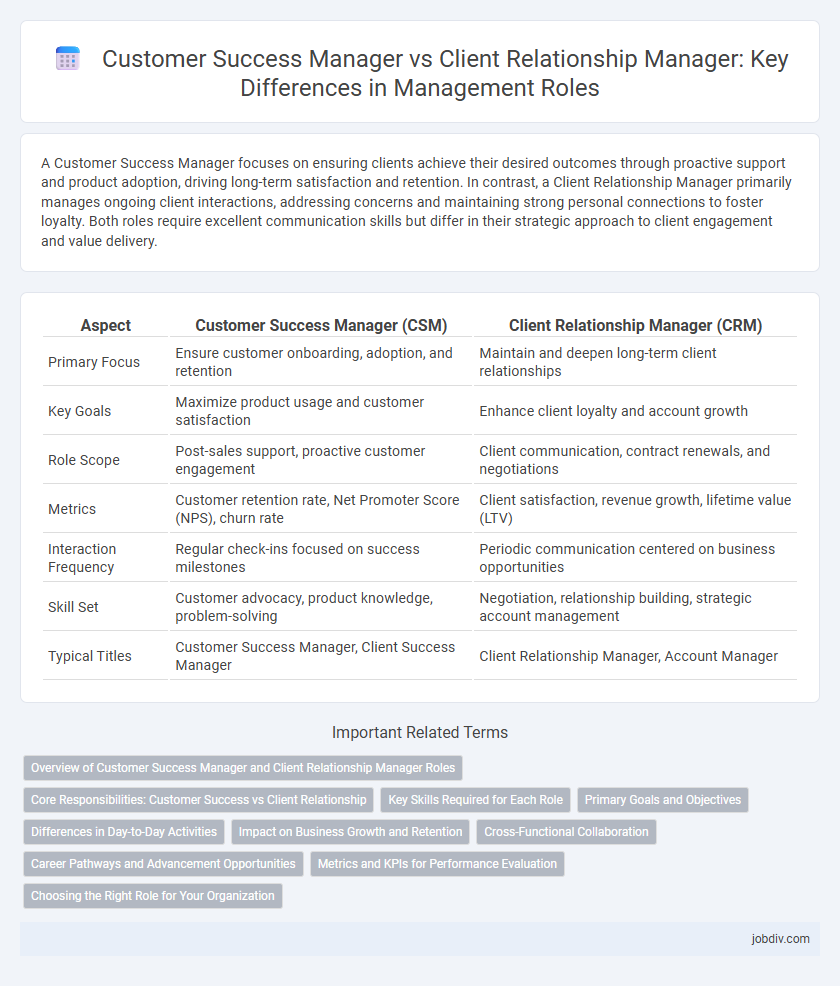A Customer Success Manager focuses on ensuring clients achieve their desired outcomes through proactive support and product adoption, driving long-term satisfaction and retention. In contrast, a Client Relationship Manager primarily manages ongoing client interactions, addressing concerns and maintaining strong personal connections to foster loyalty. Both roles require excellent communication skills but differ in their strategic approach to client engagement and value delivery.
Table of Comparison
| Aspect | Customer Success Manager (CSM) | Client Relationship Manager (CRM) |
|---|---|---|
| Primary Focus | Ensure customer onboarding, adoption, and retention | Maintain and deepen long-term client relationships |
| Key Goals | Maximize product usage and customer satisfaction | Enhance client loyalty and account growth |
| Role Scope | Post-sales support, proactive customer engagement | Client communication, contract renewals, and negotiations |
| Metrics | Customer retention rate, Net Promoter Score (NPS), churn rate | Client satisfaction, revenue growth, lifetime value (LTV) |
| Interaction Frequency | Regular check-ins focused on success milestones | Periodic communication centered on business opportunities |
| Skill Set | Customer advocacy, product knowledge, problem-solving | Negotiation, relationship building, strategic account management |
| Typical Titles | Customer Success Manager, Client Success Manager | Client Relationship Manager, Account Manager |
Overview of Customer Success Manager and Client Relationship Manager Roles
Customer Success Managers (CSMs) prioritize proactive engagement to ensure clients achieve their desired outcomes with a product or service, driving long-term retention and growth. Client Relationship Managers (CRMs) focus on maintaining and enhancing existing client relationships through consistent communication, addressing concerns, and facilitating contract renewals. Both roles emphasize customer satisfaction but differentiate in strategy, with CSMs concentrating on value realization and CRMs on relationship maintenance.
Core Responsibilities: Customer Success vs Client Relationship
Customer Success Managers focus on ensuring customer satisfaction by driving product adoption, improving user experience, and proactively addressing potential issues to maximize customer retention and growth. Client Relationship Managers prioritize building long-term partnerships through personalized communication, resolving client concerns, and understanding business needs to foster loyalty and expand service opportunities. Both roles require strong interpersonal skills, but Customer Success Managers emphasize product engagement metrics, while Client Relationship Managers concentrate on relationship depth and client advocacy.
Key Skills Required for Each Role
Customer Success Managers require strong analytical skills, product knowledge, and the ability to drive customer adoption and retention through proactive problem-solving and strategic planning. Client Relationship Managers excel in interpersonal communication, negotiation, and conflict resolution to build long-term trust and maintain high client satisfaction. Both roles demand empathy and project management capabilities but differ in focus: the former prioritizes customer lifecycle management, while the latter emphasizes maintaining and strengthening client partnerships.
Primary Goals and Objectives
Customer Success Managers primarily focus on ensuring customers achieve their desired outcomes with a product or service, driving adoption, retention, and expansion to maximize customer lifetime value. Client Relationship Managers concentrate on building and maintaining long-term relationships, fostering trust, and managing communication to support client satisfaction and loyalty. Both roles aim to enhance customer experience but differ in strategy; Customer Success Managers emphasize proactive value delivery, while Client Relationship Managers prioritize personalized interactions and relationship growth.
Differences in Day-to-Day Activities
Customer Success Managers focus on proactive engagement by analyzing customer data to ensure product adoption, delivering tailored onboarding sessions, and driving renewals to maximize lifetime value. Client Relationship Managers primarily engage in reactive communication, addressing client concerns, managing contracts, and facilitating ongoing business negotiations to maintain trust. The distinct focus lies in proactive growth strategies for Customer Success Managers versus reactive relationship maintenance for Client Relationship Managers.
Impact on Business Growth and Retention
Customer Success Managers drive business growth by proactively ensuring customers achieve desired outcomes with products, leading to higher satisfaction and increased upsell opportunities. Client Relationship Managers focus on maintaining long-term client loyalty through personalized communication and conflict resolution, which directly supports retention rates. Both roles contribute to growth and retention but emphasize different aspects: proactive value delivery versus deep relationship management.
Cross-Functional Collaboration
Customer Success Managers (CSMs) drive value by aligning product teams, sales, and support departments to enhance customer satisfaction and retention. Client Relationship Managers (CRMs) focus on maintaining direct client engagement while coordinating with marketing, finance, and service teams to address client needs and business growth. Cross-functional collaboration in both roles ensures cohesive communication and seamless service delivery to foster long-term client loyalty.
Career Pathways and Advancement Opportunities
Customer Success Managers typically advance by specializing in product expertise and cross-functional leadership, often moving into roles such as Director of Customer Success or VP of Customer Experience. Client Relationship Managers usually progress through account management or sales-focused roles, advancing toward positions like Senior Client Manager or Head of Client Relations. Both career pathways emphasize strong communication and strategic planning skills, but Customer Success roles more heavily prioritize data-driven customer retention strategies.
Metrics and KPIs for Performance Evaluation
Customer Success Managers are evaluated primarily using metrics like Customer Lifetime Value (CLV), Net Promoter Score (NPS), and churn rate to measure long-term customer retention and satisfaction. Client Relationship Managers focus on KPIs such as contract renewal rates, upsell percentages, and client communication frequency to assess relationship depth and revenue growth. Both roles rely on timely feedback loops and customer engagement scores, but their metrics emphasize proactive success management versus reactive relationship maintenance.
Choosing the Right Role for Your Organization
A Customer Success Manager focuses on proactive engagement to ensure customers achieve their desired outcomes, driving retention and long-term growth, while a Client Relationship Manager primarily manages ongoing communication and satisfaction to maintain strong client bonds. Selecting the right role depends on your organization's goals: prioritize Customer Success Managers when aiming for product adoption and upselling opportunities, and opt for Client Relationship Managers to enhance personalized service and client loyalty. Understanding these distinctions helps align team structure with strategic objectives to optimize customer journey and business performance.
Customer Success Manager vs Client Relationship Manager Infographic

 jobdiv.com
jobdiv.com